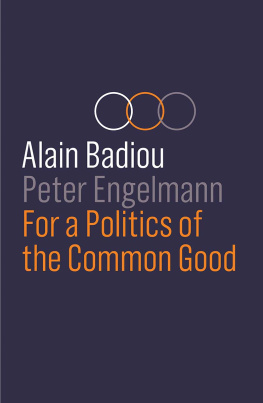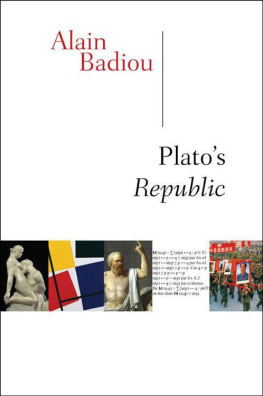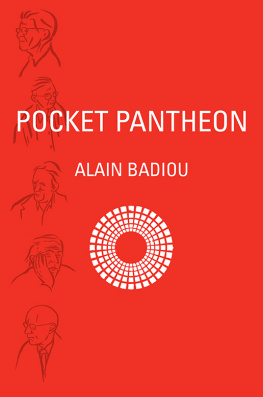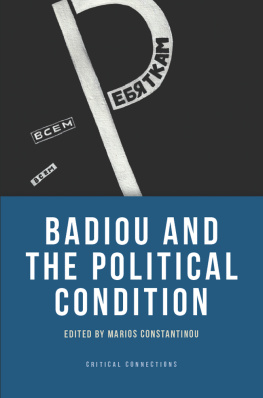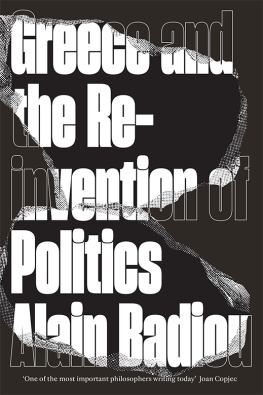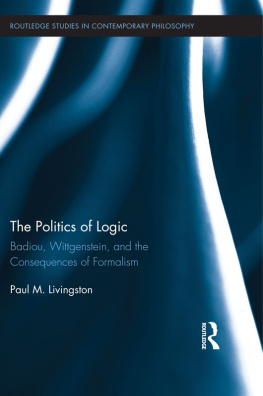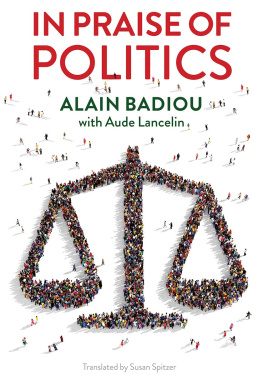
For a Politics of the Common Good
Alain Badiou and Peter Engelmann
Translated by Wieland Hoban
polity
First published in German as Fr eine Politik des Gemeinwohls Passagen Verlag, Ges.m.b.H., Wien, 2017. English language edition published by arrangement with Eulama Lit. Ag.
This English edition Polity Press, 2019
Polity Press
65 Bridge Street
Cambridge CB2 1UR, UK
Polity Press
101 Station Landing
Suite 300
Medford, MA 02155, USA
All rights reserved. Except for the quotation of short passages for the purpose of criticism and review, no part of this publication may be reproduced, stored in a retrieval system or transmitted, in any form or by any means, electronic, mechanical, photocopying, recording or otherwise, without the prior permission of the publisher.
ISBN-13: 978-1-5095-3506-4
A catalogue record for this book is available from the British Library.
Library of Congress Cataloging-in-Publication Data
Names: Badiou, Alain, author. | Engelmann, Peter, author.
Title: For a politics of the common good / Alain Badiou, Peter Engelmann.
Other titles: Fur eine Politik des Gemeinwohls. English
Description: Cambridge, UK ; Medford, MA, USA : Polity Press, [2019] | Interviews originally conducted in French but first published in German under title: Fur eine Politik des Gemeinwohls. | Includes bibliographical references.
Identifiers: LCCN 2019004027 (print) | LCCN 2019021960 (ebook) | ISBN 9781509535064 (Epub) | ISBN 9781509535040 | ISBN 9781509535057 (pb) Subjects: LCSH: Common good. | State, The. | Nationalism. | Terrorism. | Globalization. | Communism. | Identity politics. | Capitalism--Political aspects.
Classification: LCC JC330.15 (ebook) | LCC JC330.15 .B3413 2019 (print) | DDC 320.01--dc23
LC record available at https://lccn.loc.gov/2019004027
The publisher has used its best endeavours to ensure that the URLs for external websites referred to in this book are correct and active at the time of going to press. However, the publisher has no responsibility for the websites and can make no guarantee that a site will remain live or that the content is or will remain appropriate.
Every effort has been made to trace all copyright holders, but if any have been overlooked the publisher will be pleased to include any necessary credits in any subsequent reprint or edition.
For further information on Polity, visit our website: politybooks.com
Foreword
In my last public discussion with Alain Badiou in Zurichs Gessnerallee in December 2016, following my repeated objections to his call to revitalize communism as an answer to the imperialist development of globalized capitalism, he responded that he understood them within the context of my background. After the event, this remark led to heated debates; while some considered it a friendly reply, others took it as a discursive encroachment that attributed my arguments entirely to my subjective experience while presenting his own position as purely philosophical, and indeed, according to his view of philosophy, as a scientifically supported argumentation with an objective truth claim.
I do not think that Badious answer was intended as an encroachment, for, despite fundamentally different positions, we have developed a respectful conversational culture over the years and consciously cultivate it. We both pursue the aim of improving our society so that it is not a paradise for the select few, but rather liveable for all. We know of each other that we view many developments in the world with the same revulsion, even if we grasp them differently and have different notions of what we can and must do in order to improve the situation of the starving and the oppressed on this planet.
The disagreement outlined above is not marginal; after many discussions, Badiou and I have arrived time and again at the point where our irreconcilable difference of opinion regarding the communist alternative comes to the fore. And this also occurs in the present book. For my rejection of the communist alternative is not simply a matter of personal experience, but equally the result of my analysis of totalitarian structures of thought, language and action see my books on dialectic (Hegel) and deconstruction (Derrida). In our asymmetrical conversation situation, which is designed to present Badious arguments to the audience at the theatre or the readers of these conversation volumes, however, the concern is not to underpin my position, but rather to make the position of my conversational partner as clear and appreciable as possible; this aim forces me to exercise a certain restraint. At the same time, my function as the host of the meeting also demands at least a reserved identification of my own position, as this also allows Badious arguments to emerge more clearly.
But this book offers much more than a disagreement about reactivating the idea of communism, for the crises affecting our world have rapidly intensified since the publication of our last book of conversations, Philosophy and the Idea of Communism, in 2014. The ISIS terrorist attacks in France, and now also in Berlin, are increasingly forcing our Western democracies into the role of police states that erode our personal rights more and more. In response to high migratory pressure, nationalist and populist parties are becoming vastly more popular and becoming political factors with the potential to have lasting effects on our societies. Turkey and Russia are developing into autocratically governed countries, and the Trump presidency is causing many people to worry whether the institutions of American democracy can withstand his attacks. The gap between the rich and the poor, both in national and international terms, is widening in grotesque fashion. The incomes of the political class, high-ranking bureaucrats and managers have meanwhile risen to incomprehensible heights and continue to rise, while normal, formerly medium incomes are stagnating or falling. None of the privileged groups, however, needs fear being called to account for making bad decisions or causing social damage on a scale that would match exorbitant incomes. For a long time, poverty seemed concentrated in the Third World, but now the Third World is coming to us, and the falling wages and reduced income possibilities resulting from globalization create a fear of social decline, even in Western societies, and accelerate actual decline.
Badiou argues that in the age of todays globalized capitalism, with its division of labour on a global scale and the worldwide interconnection of information through the Internet, there are no longer any national solutions. Because nations and states lose meaning in favour of transnational corporations in globalized capitalism, resistance to capitalism must by definition be global too. Proceeding from this idea, Badiou not only develops his concepts of resistance but also directly takes up Marxian revolutionary theory, which always assumed that its programme could only be realized on an international scale, not within the borders of individual states.
Of Marxs four-point programme for the implementation of communism, Badiou expounds at the start of this volume, only the first point, the abolition of private property, was partially realized. The other three points, on the other hand the complete transformation of the logic of labour division, internationalism and the withering away of the state were not. To him, the task of acting to improve the world therefore consists in readopting the old plan and fully implementing it. Here as elsewhere, Badiou gives his usual answer to the many different problems stemming from globalized capitalism: we can only improve conditions, only attain a better world for the majority of people, by reviving the communist hypothesis and the communist programme as developed by Marx.
Next page
